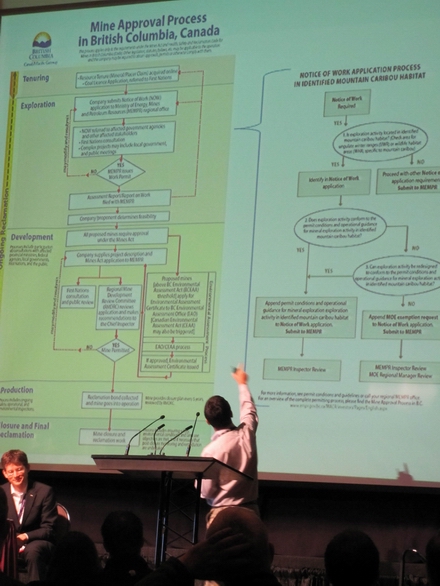Mining Mired in Red Tape
By 250 News
Thursday, April 22, 2010 12:02 PM

Byng Giraud points out how a simple permit process can be bogged down by additional requirements
Prince George, B.C.-“If red tape were nutritional, we could feed the world.” Those are the words of Byng Giraud, Vice President of Corporate Affairs for Imperial Metals Corp.
Giraud was addressing the 400+ delegates at the Minerals North conference in Prince George this morning and says while environmental groups would suggest the environmental process has never met a mine it didn’t like, miners will point out there hasn’t been a new metals mine start production since Kemess South..
Giraud says the road to permitting may seem straight forward, but each step may get bogged down with more requirements in each step. He says we have entered an era where more and more specialists must be consulted and despite their expert opinion, no one trusts what they have to say. At the same time, the general public wants more say on all development.
He calls on those in industry to press for seven points of change:
1.A harmonized federal and provincial Environmental assessment process, “We need ‘yeses’ and ‘nos’ not long term ‘maybes’. We have projects that have been stuck in ‘maybes’ for a long time.” Giraud says this makes good sense because it reduces duplication and saves taxpayer dollars.
2. Timelines needed for notices of work consultations and other processes
3.Customer driven audits and reviews of regulation and a[placation of regulation
4.Real regulation “sunshine” clauses and grandfathering
5.If First Nations are to comment, they must be adequately supported and there must be substantive comment.
6.All external comment must also have time limits
7.Principles based, not rules based or Best Practices vs Prescription.
He says the permit process should be principle based where companies do things because it’s the right thing to do rather than making it rule based where you do it not because it’s the right thing, but because if you don’t you’ll get in trouble. “There are companies in this room that would like to do the right thing, but are afraid to make a move because it will make them have to go back to the beginning of the process again.”
No one knows better about red tape than Terrane metals. That company has been working several years to bring the Mount Milligan Mine to fruition. The project is 155 km northwest of Prince George and would provide a significant number of construction jobs over the next two years, and 400 direct jobs when the mine is up and running.
Terrane Metals’ Glen Wonders says it is a very, very significant task to undertake the certification of a mine in British Columbia, “There’s absolutely no stepping around that, so you have to be prepared for those timelines. I think there is room for improvement , I look forward to seeing that opportunity realized. Obviously we have to mines that are thoroughly reviewed and meet the standards of the environmental and social needs of the region, province and country.”
Previous Story - Next Story
Return to Home








